Fleurs du Mal Magazine


Or see the index

The Sorrows of Young Werther (65) by J.W. von Goethe
The whole force of these words fell upon the unfortunate Werther. Full
of despair, he threw himself at Charlotte’s feet, seized her hands, and
pressed them to his eyes and to his forehead. An apprehension of
his fatal project now struck her for the first time. Her senses were
bewildered: she held his hands, pressed them to her bosom; and, leaning
toward him with emotions of the tenderest pity, her warm cheek touched
his. They lost sight of everything. The world disappeared from their
eyes. He clasped her in his arms, strained her to his bosom, and covered
her trembling lips with passionate kisses. “Werther!” she cried with a
faint voice, turning herself away; “Werther!” and, with a feeble hand,
she pushed him from her. At length, with the firm voice of virtue, she
exclaimed, “Werther!” He resisted not, but, tearing himself from her
arms, fell on his knees before her. Charlotte rose, and, with disordered
grief, in mingled tones of love and resentment, she exclaimed, “It is
the last time, Werther! You shall never see me any more!” Then, casting
one last, tender look upon her unfortunate lover, she rushed into the
adjoining room, and locked the door. Werther held out his arms, but
did not dare to detain her. He continued on the ground, with his head
resting on the sofa, for half an hour, till he heard a noise which
brought him to his senses. The servant entered. He then walked up and
down the room; and, when he was again left alone, he went to Charlotte’s
door, and, in a low voice, said, “Charlotte, Charlotte! but one word
more, one last adieu!” She returned no answer. He stopped, and listened
and entreated; but all was silent. At length he tore himself from the
place, crying, “Adieu, Charlotte, adieu for ever!”
Werther ran to the gate of the town. The guards, who knew him, let him
pass in silence. The night was dark and stormy,–it rained and snowed.
He reached his own door about eleven. His servant, although seeing him
enter the house without his hat, did not venture to say anything; and;
as he undressed his master, he found that his clothes were wet. His hat
was afterward found on the point of a rock overhanging the valley; and
it is inconceivable how he could have climbed to the summit on such a
dark, tempestuous night without losing his life.
He retired to bed, and slept to a late hour. The next morning his
servant, upon being called to bring his coffee, found him writing. He
was adding, to Charlotte, what we here annex.
“For the last, last time I open these eyes. Alas! they will behold the
sun no more. It is covered by a thick, impenetrable cloud. Yes, Nature!
put on mourning: your child, your friend, your lover, draws near his
end! This thought, Charlotte, is without parallel; and yet it seems
like a mysterious dream when I repeat–this is my last day! The last!
Charlotte, no word can adequately express this thought. The last! To-day
I stand erect in all my strength to-morrow, cold and stark, I shall lie
extended upon the ground. To die! what is death? We do but dream in our
discourse upon it. I have seen many human beings die; but, so straitened
is our feeble nature, we have no clear conception of the beginning or
the end of our existence. At this moment I am my own–or rather I am
thine, thine, my adored! and the next we are parted, severed–perhaps
for ever! No, Charlotte, no! How can I, how can you, be annihilated? We
exist. What is annihilation? A mere word, an unmeaning sound that fixes
no impression on the mind. Dead, Charlotte! laid in the cold earth, in
the dark and narrow grave! I had a friend once who was everything to me
in early youth. She died. I followed her hearse; I stood by her grave
when the coffin was lowered; and when I heard the creaking of the cords
as they were loosened and drawn up, when the first shovelful of earth
was thrown in, and the coffin returned a hollow sound, which grew
fainter and fainter till all was completely covered over, I threw myself
on the ground; my heart was smitten, grieved, shattered, rent–but I
neither knew what had happened, nor what was to happen to me. Death!
the grave! I understand not the words.–Forgive, oh, forgive me!
Yesterday–ah, that day should have been the last of my life! Thou
angel! for the first time in my existence, I felt rapture glow within
my inmost soul. She loves, she loves me! Still burns upon my lips the
sacred fire they received from thine. New torrents of delight overwhelm
my soul. Forgive me, oh, forgive!
The Sorrows of Young Werther (Die Leiden des jungen Werther) by J.W. von Goethe. Translated by R.D. Boylan.
To be continued
fleursdumal.nl magazine
More in: -Die Leiden des jungen Werther, Goethe, Johann Wolfgang von
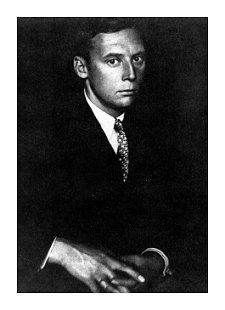
Johannes Theodor Baargeld
(1892-1927)
Kommestibel, Dörrgemüse
Kommestibel, Dörrgemüse
Habeas Strunk und Gedrüse
Aber niemals geht er aus
Solch ein Haus!
Bibane Cactis Azaleen
Dörrgemüse Poprobäen
Nur der kleine Hanns verstäen
Wie sie wähen.
Doch nun ist der Tag gekommen
Guttaperchatränen kommen
War ich doch nie angekommen
Und jetzt eben erst gekommen.
(1926)
Johannes Theodor Baargeld poetry
fleursdumal.nl magazine
More in: Archive A-B, Baargeld, Johannes Theodor
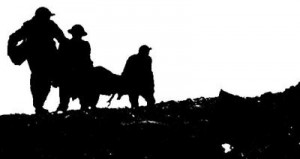
Edward Thomas
(1878 – 1917)
As the team’s head brass
As the team’s head brass flashed out on the turn
The lovers disappeared into the wood.
I sat among the boughs of the fallen elm
That strewed an angle of the fallow, and
Watched the plough narrowing a yellow square
Of charlock. Every time the horses turned
Instead of treading me down, the ploughman leaned
Upon the handles to say or ask a word,
About the weather, next about the war.
Scraping the share he faced towards the wood,
And screwed along the furrow till the brass flashed
Once more.
The blizzard felled the elm whose crest
I sat in, by a woodpecker’s round hole,
The ploughman said. ‘When will they take it away?’
‘When the war’s over.’ So the talk began –
One minute and an interval of ten,
A minute more and the same interval.
‘Have you been out?’ ‘No.’ ‘And don’t want to, perhaps?’
‘If I could only come back again, I should.
I could spare an arm. I shouldn’t want to lose
A leg. If I should lose my head, why, so,
I should want nothing more….Have many gone
From here?’ ‘Yes.’ ‘Many lost?’ ‘Yes, a good few.
Only two teams work on the farm this year.
One of my mates is dead. The second day
In France they killed him. It was back in March,
The very night of the blizzard, too. Now if
He had stayed here we should have moved the tree.’
‘And I should not have sat here. Everything
Would have been different. For it would have been
Another world.’ ‘Ay, and a better, though
If we could see all all might seem good.’ Then
The lovers came out of the wood again:
The horses started and for the last time
I watched the clods crumble and topple over
After the ploughshare and the stumbling team.
Edward Thomas poetry
fleursdumal.nl magazine
More in: Archive S-T, Thomas, Edward
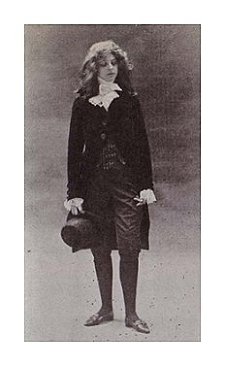
Renée Vivien
(1877-1909)
Elle règne
Le soir était plus doux que l’ombre d’une fleur.
J’entrai dans l’ombre ainsi qu’en un parfait asile.
La voix, récompensant mon attente docile,
Me chuchota: “Vois le palais de la douleur”.
Mes yeux las s’enchantaient du violet, couleur
Unique car le noir dominait. Immobile
La douleur demeurait assise, très tranquille.
J’admirais l’unité de sa grande pâleur.
Mon coeur se resserait dans un étau funeste,
Et j’allais m’éloigner, lorsqu’elle me dit : reste,
Aussitôt j’entendis prolonger un sanglot.
Dans la salle du trône, un clair de lune blême
Envahissait la nuit, comme un rocher le flot,
Et la Douleur régnait, implacable et suprême.
Renée Vivien poetry
fleursdumal.nl magazine
More in: Archive U-V, Renée Vivien, Vivien, Renée
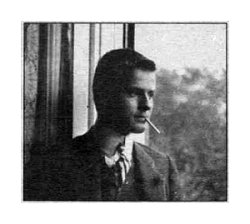
Hans Leybold
(1892-1914)
Der Tod des Menschen
Er hatte auf einmal kein Gesicht mehr.
Wo das sonst war, war nun eine weiße Fläche.
Seine Augen waren hinter die Schädelwand gerutscht.
Die Hände lagen unter seinen Füßen: man wusste
nicht, wie sie dorthin gekommen waren.
Seine Stimme war unter den Tisch gefallen; hatte
dort gescheppert, wie ein Tonteller; und war
dann plötzlich zerbrochen, mit einem letzten Klang.
Eine unvermutete Zigarre rauchte sich selbst auf.
Blies blaue Dünste.
Die krochen schweigsam in die getilgten Nasenlöcher des Menschen.
Da bissen sie sich fest; kratzten unnervige Wände. – –
Des Menschen Seele aber stolperte schon in paradiesischen Feldern.
Keine Windmühle störte seine nichterhoffte Aussicht.
Der Blick war weit und groß und grün.
Insekten tanzten golden.
Äcker brannten.
Hans Leybold poetry
fleursdumal.nl magazine
More in: *War Poetry Archive, Archive K-L, Expressionism, Hans Leybold, Leybold, Hans

The Sorrows of Young Werther (64) by J.W. von Goethe
A torrent of tears which streamed from Charlotte's eyes and gave relief
to her bursting heart, stopped Werther's recitation. He threw down the
book, seized her hand, and wept bitterly. Charlotte leaned upon her
hand, and buried her face in her handkerchief: the agitation of both was
excessive. They felt that their own fate was pictured in the misfortunes
of Ossian's heroes, they felt this together, and their tears redoubled.
Werther supported his forehead on Charlotte's arm: she trembled, she
wished to be gone; but sorrow and sympathy lay like a leaden weight upon
her soul. She recovered herself shortly, and begged Werther, with broken
sobs, to leave her, implored him with the utmost earnestness to comply
with her request. He trembled; his heart was ready to burst: then,
taking up the book again, he recommenced reading, in a voice broken by
sobs.
"Why dost thou waken me, O spring? Thy voice woos me, exclaiming,
I refresh thee with heavenly dews; but the time of my decay is
approaching, the storm is nigh that shall whither my leaves. Tomorrow
the traveller shall come, he shall come, who beheld me in beauty: his
eye shall seek me in the field around, but he shall not find me."
The Sorrows of Young Werther (Die Leiden des jungen Werther) by J.W. von Goethe. Translated by R.D. Boylan.
To be continued
fleursdumal.nl magazine
More in: -Die Leiden des jungen Werther, Goethe, Johann Wolfgang von
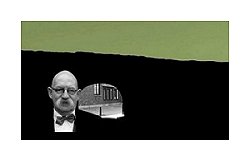
Campo Santo
Een ieder die hier ligt is voortaan vrij
van hielgelik of van genadebrood. Gewijd
spiegelt dit veld zich in verstening: als
een wingewest is het schatplichtig
aan de dood. Schaduw valt er opzij
alsof ze sneuvelt. Stilte komt hier zelden
tot bedaren.
Bert Bevers
(eerder verschenen in Onaangepaste tijden, Zinderend, Bergen op Zoom, 2006)
fleursdumal.nl magazine
More in: Archive A-B, Bevers, Bert
Anna de Noailles
(1876-1933)
La mort fervente
Mourir dans la buée ardente de l’été,
Quand parfumé, penchant et lourd comme une grappe,
Le coeur, que la rumeur de l’air balance et frappe,
S’égrène en douloureuse et douce volupté.
Mourir, baignant ses mains aux fraîcheurs du feuillage,
Joignant ses yeux aux yeux fleurissants des bois verts,
Se mêlant à l’antique et naissant univers,
Ayant en même temps sa jeunesse et son âge,
S’en aller calmement avec la fin du jour ;
Mourir des flèches d’or du tendre crépuscule,
Sentir que l’âme douce et paisible recule
Vers la terre profonde et l’immortel amour.
S’en aller pour goûter en elle ce mystère
D’être l’herbe, le grain, la chaleur et les eaux,
S’endormir dans la plaine aux verdoyants réseaux,
Mourir pour être encor plus proche de la terre…
Anna de Noailles poetry
fleursdumal.nl magazine
More in: Archive M-N, Noailles, Anna de
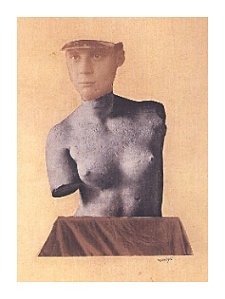
Johannes Theodor Baargeld
(1892-1927)
Armada Duldgedalzen
(sie ist Mitglied der Z/w 3)
Der erste Schmerz der Litfassäule war kein Kind
Jedoch der zweite war eins stand neben ihr und hiess
Armada Duldgedalzen ozeanisches
Drittmädchen und Prinzé – sin
Von Haar zu Haar hing ihr
Die Augenpracht schon damals so sehr fertig dass
Die Litfasshunde von hinten bellten Ueber Kopf
Besprangen sie die Erstgeburt Armada Duldgedalzen Doch
Vergebens sie besprangen sich nur selber
Mittlerweilen zeigten sich die ersten
Einhundertsiebenundzwanzig linken Ohre die die
Kluge Magd Orella
(von Ohr) Orella Muschelsilben nannte
Orella Muschelsilben war der Efeu ihres
Heiligtums bevor und nachdem
Sie sich ein Volk gewünscht Nur
Rechts sollte sie bloss bleiben ein
Einzig rechtes Ohr bald seltsam bald
Natürliches Rasierbecken ihrer Schnecken
Schaukelte es dann den Schaum
Bedürfnismäßig über Stab und Hörnchen
Denn man entschloss sich ja ihren
Leib aus den Tränenzapfen Martin Luthers
Zu kleben und schwedischen Zündhölzern
Und zwar nie Kopf auf Kropf auf die beliebte
Art des Erfinders O Armada Duldgedalzen
Sollst je du sollst du Schwänin auf dem Ozean
(1920)
Johannes Theodor Baargeld poetry
fleursdumal.nl magazine
More in: Archive A-B, Baargeld, Johannes Theodor
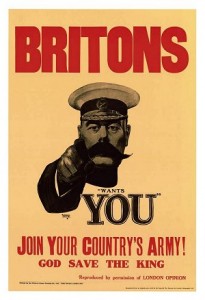
John Jarmain
(1911 – 1944)
El Alamein
There are flowers now, they say, at Alamein;
Yes, flowers in the minefields now.
So those that come to view that vacant scene,
Where death remains and agony has been
Will find the lilies grow –
Flowers, and nothing that we know.
So they rang the bells for us and Alamein,
Bells which we could not hear:
And to those that heard the bells what could it mean,
That name of loss and pride, El Alamein?
– Not the murk and harm of war,
But their hope, their own warm prayer.
It will become a staid historic name,
That crazy sea of sand!
Like Troy or Agincourt its single fame
Will be the garland for our brow, our claim,
On us a fleck of glory to the end:
And there our dead will keep their holy ground.
But this is not the place that we recall,
The crowded desert crossed with foaming tracks,
The one blotched building, lacking half a wall,
The grey-faced men, sand powdered over all;
The tanks, the guns, the trucks,
The black, dark-smoking wrecks.
So be it: none but us has known that land:
El Alamein will still be only ours
And those ten days of chaos in the sand.
Others will come who cannot understand,
Will halt beside the rusty minefield wires
And find there – flowers.
Mareth, Tunisia. March, 1943
John Jarmain poetry
fleursdumal.nl magazine
More in: Archive I-J, Jarmain, John

Georg Trakl
(1887 – 1914)
Grodek
Am Abend tönen die herbstlichen Wälder
Von tödlichen Waffen, die goldnen Ebenen
Und blauen Seen, darüber die Sonne
Düster hinrollt; umfängt die Nacht
Sterbende Krieger, die wilde Klage
Ihrer zerbrochenen Münder.
Doch stille sammelt im Weidengrund
Rotes Gewölk, darin ein zürnender Gott wohnt,
Das vergossne Blut sich, mondne Kühle;
Alle Straßen münden in schwarze Verwesung.
Unter goldnem Gezweig der Nacht und Sternen
Es schwankt der Schwester Schatten durch den schweigenden Hain,
Zu grüßen die Geister der Helden, die blutenden Häupter;
Und leise tönen im Rohr die dunkeln Flöten des Herbstes.
O stolzere Trauer! ihr ehernen Altäre,
Die heiße Flamme des Geistes nährt heute ein gewaltiger Schmerz,
Die ungebornen Enkel.
Georg Trakl poetry
fleursdumal.nl magazine
More in: Archive S-T, Trakl, Georg, Trakl, Georg
Julian Grenfell
(1888 – 1915)
INTO BATTLE
The naked earth is warm with spring,
And with green grass and bursting trees
Leans to the sun’s gaze glorying,
And quivers in the sunny breeze;
And life is colour and warmth and light,
And a striving evermore for these;
And he is dead who will not fight;
And who dies fighting has increase.
The fighting man shall from the sun
Take warmth, and life from the glowing earth;
Speed with the light-foot winds to run,
And with the trees to newer birth;
And find, when fighting shall be done,
Great rest and fullness after dearth.
All the bright company of Heaven
Hold him in their high comradeship,
The Dog-Star, and the Sisters Seven,
Orion’s Belt and sworded hip.
The woodland trees that stand together,
They stand to him each one a friend;
They gently speak in the windy weather;
They guide to valley and ridge’s end.
The kestrel hovering by day,
And the little owls that call by night,
Bid him be swift and keen as they,
As keen of ear, as swift of sight.
The blackbird sings to him, ‘Brother, brother,
If this be the last song you shall sing,
Sing well, for you may not sing another;
Brother, sing.’
In dreary, doubtful, waiting hours,
Before the brazen frenzy starts,
The horses show him nobler powers;
O patient eyes, courageous hearts!
And when the burning moment breaks,
And all things else are out of mind,
And only Joy of Battle takes
Him by the throat, and makes him blind,
Through joy and blindness he shall know,
Not caring much to know, that still
Nor lead nor steel shall reach him, so
That it be not the Destined Will.
The thundering line of battle stands,
And in the air Death moan and sings;
But Day shall clasp him with strong hands,
And Night shall fold him in soft wings.
Julian Grenfell poetry
fleursdumal.nl magazine
More in: Archive G-H, Greenfel, Julian
Thank you for reading Fleurs du Mal - magazine for art & literature